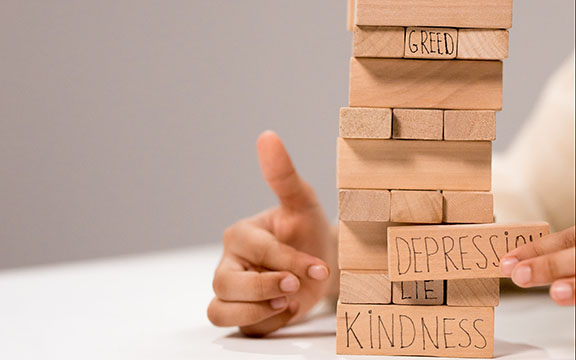
Photo by Hassan OUAJBIR from Pexels
Here is my radical proposition: All attempts at growth motivated by disguised self-hatred ultimately fail, and often cause harm.
Being “good enough” is only a thought, a mental construct. Nobody can be “good enough,” because that’s just a thought. If we imagine some way we should be, and then we berate ourselves for not living up to how we imagine we should be, that is just this bizarre thing the mind does of beating itself up. Sometimes it does that because of childhood conditioning.
But on the spiritual path, the key is to realize every disguise worn by the simple false belief: “I’m not as I should be.” Every time we spot another disguise of that belief, we can practice remembrance: “Oh, that’s just another version of ‘I’m not as I should be.’ That’s just a thought and I suffer when I believe it is true, and I can practice over and over laying it aside and seeing that it’s impossible to be other than I am right now. To believe ‘I’m not as I should be is’ is craziness!”
We couldn’t have overcome obstacles in the past with wisdom we only have in this moment. Conditions of embodiment didn’t allow us to act in the way we would have wanted to in that moment. We believe we should have acted in such and such way, but it’s only now we have the knowledge or insight of our present self. It’s impossible for the past self, even the past self of last week, to have acted on the present self’s insight! That’s science fiction. Whatever inspiration, love, softness, wisdom we can access in any moment is enough.
What we can access in the present moment has to be good enough. It’s determined by the structure of reality itself, and reality cannot be wrong. We can only access what we can access in any given moment, and needed resources may not be accessible due to our karma, samskāras, past experiences, trauma, cultural conditioning, and/or how we were raised. When we are very young, we are just so unbelievably open and receptive. And, all it takes is for somebody to say, suggest, or imply that we should have been different, that if only we had done something different it would have been better. That just gets internalized—it gets deeply internalized. The deeper it went in, the more true it seems today, even though it’s completely false. And whatever is internalized at a young age seems really, really true for so many years after that until we do the work of energetically digesting these experiences. They are worthy of grieving, but they’re not worthy of retaining indefinitely.
And, there’s another piece of this teaching that can sometimes work for some people and that is to understand that there’s an element of hubris here. Who are we to believe that the Universe made us wrong? If the Universe is a Super-Intelligent Force, then we are exactly as we should be in every single moment.
Most kids are surrounded by people who are clueless about how the messaging they transmit is damaging and this sets up a false belief that we should have been different. We couldn’t have been different and it couldn’t have been our fault. It’s up to the adults surrounding us to have taken care of their kids. On behalf of humanity, I’m so sorry that so many of you got that wrong message. Now, you can release it. And, also, those adults couldn’t have been otherwise than how they were. They couldn’t have helped but blame you because that’s what people do when they are hurt and angry—they lash out in one way or another.
It is absolutely key that you catch every version, every thought that boils down to “I’m not as I should be.” It’s craziness—literal insanity—to believe the thought “I’m not as I should be.” Why? We cannot be other than as we are. Any “wrongness” attributed to any aspect of our being is purely on the basis of some other story. How can a thought be true when it is only justified by other thoughts that aren’t true and those thoughts are justified by other thoughts that aren’t true? It’s “turtles all the way down”—an expression of the problem of infinite regress. Follow the train of thought and you see: “This is just thoughts justifying other thoughts; there’s no truth to rest on anywhere here.” It’s worth doing that introspection over and over with each thought.

Photo by Ron Lach from Pexels
This notion that we must improve ourselves because we’re not good enough is just part of a thought-world resting on the blocks of other thoughts. And, as we pull each thought out of this “Jenga” game, the whole structure finally just collapses and we are free. So, I would ask you: Please don’t give up on that project of pulling the Jenga blocks out, because that’s utterly life changing and you can never go back. We can reach a point—we might call liberation—where we can’t believe those sorts of thoughts anymore.
Radical self-acceptance doesn’t enable less healthy behavior. It just means noticing that “This is a feature of my behavior currently and this can change at any time.” Through this approach, we lay the foundation for change with acceptance.
Here’s a practice you can try: If we make space for whatever needs emotional digesting, we can trust in whatever arises. For example, if you have anxiety, you can sit with anxiety and really get intimate with the physiology—what exactly are you feeling in the body? And then, create spaciousness around it. Make it okay to be feeling what you are feeling, create some space around it, and hold it in loving awareness—the same way you would hold a baby or child who is expressing anxiety or upset. If you really practice that, you might come to a point where you feel: “It would be okay if this anxiety continues indefinitely. It would be okay because I now know how to hold space around it, how to hold it lovingly, how to not to label it as ‘wrong.’”
There’s a curious phenomenon that occurs if you really give it permission to stay indefinitely—then, it doesn’t need to. But you have to really give it permission. And, to give it permission, you have to really, truly find a way to be okay with it. So, whatever unresolved experiences need resolution, they will arise at the right time to be integrated in this way. At least once a week, have your meditation be to give space to whatever needs to arise and move through; and some energy will digest and the rest will move through.
There can be a phase, for some, where there’s a lot coming up from the past—could be for days or even weeks—where it’s just time for it to clear. It can just come in wave after wave after wave. And if that does happen to you, please remember these words: In the middle of what’s arising, you may think it’s never going to stop—like someone on a bad trip who feels, “I’m never going to come down; I’m never going to be sober and sane again.” But they’re wrong. And, in the same way, if you are in that phase where there is a lot coming up to clear your system—it can go on for months (at the most)—and you might think it will go on forever, but it won’t. The reason this is so important is because if you suppress the process because you think you have to, that’s not a good idea. It’s good to let it keep going and it will take a few weeks or months. (Please note that if the process of releasing a set of samskāras or vāsanās goes on longer than that, you might be in a cycle of getting retraumatized and you should consider seeking professional support.)
And, it’s also okay to long for a deeper sense of our own divinity and beauty; that’s part of what makes us perfect in this moment. The fact that we long for this deeper sense is part of our perfection now. So, we can follow that longing and it doesn’t contradict the fact that we are complete and nothing needs to be different now, even as we follow the track of our longing.
In the Yoga tradition, there’s a teaching that the deepest level of our being—whether you call it soul, Self, or whatever—is always unwounded and unwoundable; untraumatized and untraumatizable. The deepest level of our being is always already perfectly okay. We may not have access to it, but that’s what Yoga is all about: giving us that access. There is also this teaching that there’s a still point of absolute peace and repose at the deepest center of our being that we can drop into again and again. We can try to access the level of our being that is already okay. We don’t have to make ourselves feel any particular way because this already exists within us as our essence-nature.
Please remember that your worth is proven by your very existence. Your very being generates value. You are a unique way of life experiencing itself. The purpose of your life is fulfilled in every moment because your very being generates value. May each of us realize the true radiance of our hearts.
About the Author:
 Christopher Wallis, also known as Hareesh, is a scholar-practitioner with thirty years of experience, having been initiated into the practice of yogic meditation at sixteen, and fifteen years of formal education. His degrees include a B.A. in Religion and Classics from the University of Rochester, an M.A. in Sanskrit from U.C. Berkeley, an M.Phil. in Classical Indian Religions from Oxford, and a Ph.D. in Sanskrit from U.C. Berkeley. Additionally, he received traditional education at Yoga āshrams, training in meditation, mantra-science, kīrtan, Karma-Yoga, and pedagogy. He currently teaches meditation, Yoga darśana (practical philosophy), Nondual Saiva Yoga philosophy, Sanskrit, and mantra-science. Hareesh is the author of Tantra Illuminated: The Philosophy, History, and Practice of a Timeless Tradition and The Recognition Sutras: Illuminating a 1,000-year-old Spiritual Masterpiece. He is the Founder and Head Faculty of TantraIlluminated.org.
Christopher Wallis, also known as Hareesh, is a scholar-practitioner with thirty years of experience, having been initiated into the practice of yogic meditation at sixteen, and fifteen years of formal education. His degrees include a B.A. in Religion and Classics from the University of Rochester, an M.A. in Sanskrit from U.C. Berkeley, an M.Phil. in Classical Indian Religions from Oxford, and a Ph.D. in Sanskrit from U.C. Berkeley. Additionally, he received traditional education at Yoga āshrams, training in meditation, mantra-science, kīrtan, Karma-Yoga, and pedagogy. He currently teaches meditation, Yoga darśana (practical philosophy), Nondual Saiva Yoga philosophy, Sanskrit, and mantra-science. Hareesh is the author of Tantra Illuminated: The Philosophy, History, and Practice of a Timeless Tradition and The Recognition Sutras: Illuminating a 1,000-year-old Spiritual Masterpiece. He is the Founder and Head Faculty of TantraIlluminated.org.
(This article is an edited transcript of a live teaching session.)

